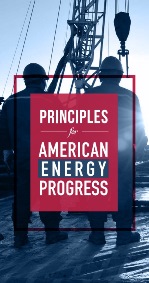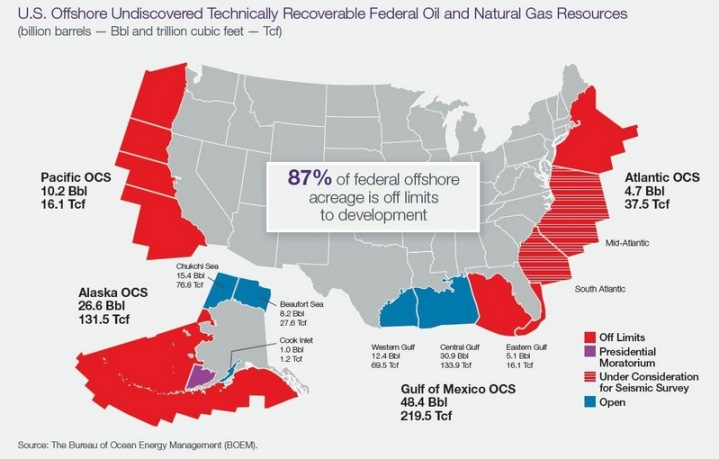The Right Policies for Offshore Energy Progress
Mark Green
Posted April 14, 2016
Take a look at details of API’s energy policy recommendations to the two political parties from this week’s Vote4Energy event. They include access to oil and natural gas resources and an approach to oversight that fosters the goal of safe and responsible energy development.
 Access is critically important, especially when you’re talking about developing offshore oil and natural gas reserves. Today, 87 percent of offshore acreage under federal control remains off limits to energy development. From API’s platform report:
Access is critically important, especially when you’re talking about developing offshore oil and natural gas reserves. Today, 87 percent of offshore acreage under federal control remains off limits to energy development. From API’s platform report:
Opening areas in the Atlantic, Pacific and Eastern Gulf of Mexico could lead to production of more than 3.5 million barrels of oil equivalent per day. And with smart revenue-sharing policies, the revenue generated by this offshore oil and natural gas production could help state and local governments afford to develop or upgrade tourist attractions, infrastructure and beach projects. Every state that hosts oil and natural gas development off its shores should get a fair share of the revenue collected by the federal government.
Likewise, the U.S. energy revolution – which has made the United States the world’s leading oil and natural gas producer – shows how energy can grow the economy, create jobs and protect the environment through market-driven innovation. This must be allowed to continue, through sound, bipartisan energy choices backed by the American people. The report:
The industry has been a leader in advancing innovative technologies both for production and emissions reductions and stands as a willing partner with the government in the development of industry standards and best practices - using this as an effective means to meet the mutually shared objective of safe and responsible operations that protect our air, water, workers, and communities.
Offshore access and effective oversight both were the focus of a press briefing this week by Erik Milito, API’s group director for upstream and industry operations – timely with the Interior Department’s Bureau of Safety and Environmental Enforcement (BSEE) releasing proposed well control regulations. Milito:
“The U.S. offshore, particularly the Gulf of Mexico, is a vital part of our energy production. Right now we’re at near-record highs in the amount of oil that’s being produced from the Gulf of Mexico. So what we’re seeing in this country, in terms of being an energy superpower, is being driven not only by the shale revolution but by our leadership in offshore. It’s unfortunate that the administration is not allowing us to pursue potential new opportunities in places like the Atlantic, they’re not looking at the Eastern Gulf. But they should make sure that they maintain Gulf of Mexico and Alaska because of the energy security and the national security aspects they [those areas] are providing to our country, as well as the economic impacts we get from those jobs that are created along the Gulf Coast and potentially off Alaska.”

Milito said accessing offshore oil and natural gas is safer now than ever before. Since 2010 industry has published more than 100 new and revised standards for well design, blowout prevention equipment, worker safety and other aspects of offshore exploration and production. These include standards for systems for drilling wells developed over a two-year period. The Center for Offshore Safety was created to foster a culture of safety in offshore development, which it is doing by collecting data and analyzing and reporting on safety performance.
Milito spent much of the teleconference talking about Interior’s well control rule, which industry is now reviewing in the context of official comments submitted to BSEE last year. Industry has cautioned that element in the initial proposal had technical problems, which if left unchanged, could make offshore operations less safe. Milito:
“Offshore oil and natural gas development in the U.S. is safer than ever before thanks to diligent, continuous industry leadership and efforts of industry and regulators. It is imperative that BSEE ensure any new regulatory requirement does not unnecessarily erode the strong safety and national security gains that have been achieved in the last half decade.”
During the reporter teleconference, Milito said the well control rule would affect offshore energy projects for years to come. He said time and diligence should be taken to make the rule technically sound:
“This is a trend we’re seeing across the regulatory framework, not just with this rule. This rule itself is really emblematic of concerns that the industry has had with the process that the administration is following to create rules. We should not be engaging in a rush to get rules done. We should be engaging in a process to get rules right.”
About The Author
Mark Green joined API after a career in newspaper journalism, including 16 years as national editorial writer for The Oklahoman in the paper’s Washington bureau. Previously, Mark was a reporter, copy editor and sports editor at an assortment of newspapers. He earned his journalism degree from the University of Oklahoma and master’s in journalism and public affairs from American University. He and his wife Pamela have two grown children and six grandchildren.


